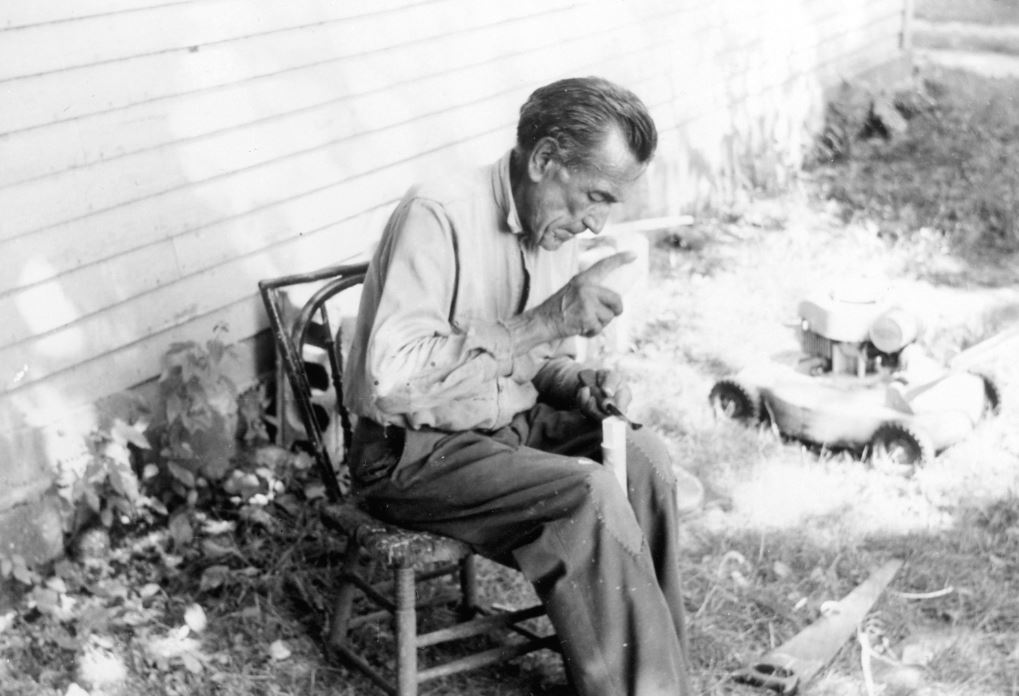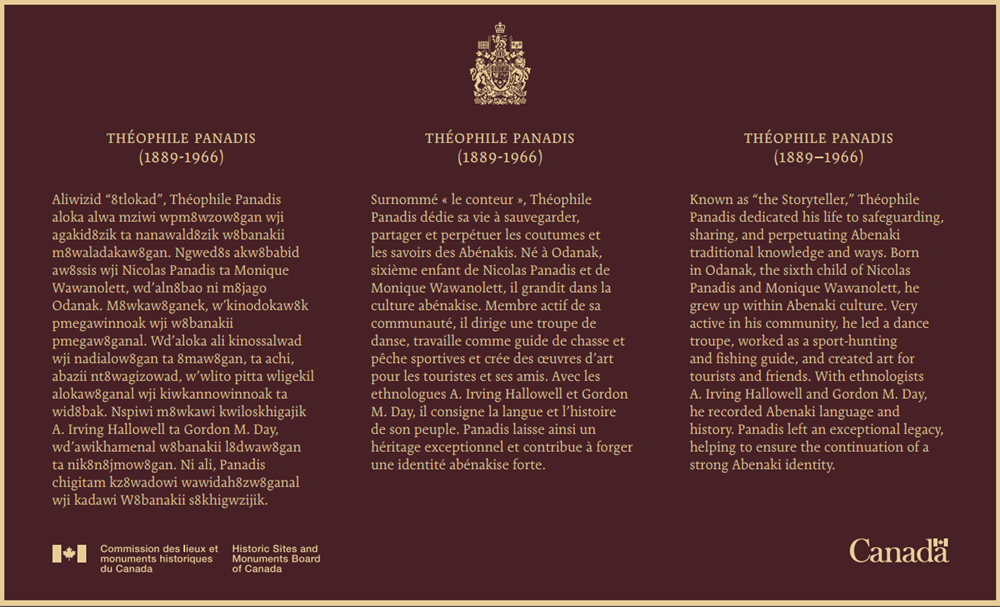Théophile Panadis National Historic Person (1889–1966)

© Collège Dartmouth / Musée des Abénakis
Theophile Panadis (1889–1966) was designated a national historic person in 2011.
Historical importance: Safeguarded and perpetuated Abenaki traditions, thus contributing to the strength and influence of the Abenaki arts and identity.
Commemorative plaque: Odanak, QuebecFootnote 1
Théophile Panadis (1889–1966)
Known as “the Storyteller,” Théophile Panadis dedicated his life to safeguarding, sharing, and perpetuating Abenaki traditional knowledge and ways. Born in Odanak, the sixth child of Nicolas Panadis and Monique Wawanolett, he grew up within Abenaki culture. Very active in his community, he led a dance troupe, worked as a sport-hunting and fishing guide, and created art for tourists and friends. With ethnologists A. Irving Hallowell and Gordon M. Day, he recorded Abenaki language and history. Panadis left an exceptional legacy, helping to ensure the continuation of a strong Abenaki identity.
Théophile Panadis (1889–1966)
Aliwizid “8tlokad”, Théophile Panadis aloka alwa mziwi wpm8wzow8gan wji agakid8zik ta nanawald8zik w8banakii m8waladakaw8gan. Ngwed8s akw8babid aw8ssis wji Nicolas Panadis ta Monique Wawanolett, wd’aln8bao ni m8jago Odanak. M8wkaw8ganek, w’kinodokaw8k pmegawinnoak wji w8banakii pmegaw8ganal. Wd’aloka ali kinossalwad wji nadialow8gan ta 8maw8gan, ta achi, abazii nt8wagizowad, w’wlito pitta wligekil alokaw8ganal wji kiwkannowinnoak ta wid8bak. Nspiwi m8wkawi kwiloskhigajik A. Irving Hallowell ta Gordon M. Day, wd’awikhamenal w8banakii l8dwaw8gan ta nik8n8jmow8gan. Ni ali, Panadis chigitam kz8wadowi wawidah8zw8ganal wji kadawi W8banakii s8khigwzijik.
Théophile Panadis (1889-1966)

Théophile Panadis dedicated his life to safeguarding, sharing, and perpetuating Abenaki traditional knowledge and ways. Born in Odanak, Quebec, Panadis dedicated himself to passing on his vast knowledge of Abenaki culture and history to his community and sharing it with non-Indigenous people. He was a storyteller, artist, leader of a dance troop, and sought-after sport-hunting and fishing guide. His efforts left an exceptional legacy that helped to ensure the continuation of a strong Abenaki identity.
Early years
Théophile Panadis was the sixth child of Nicolas Panadis and Monique Wawanolett. He was born in 1899 in Odanak, an Abenaki village located along the Saint-François River. He grew up at a time when traditional Abenaki culture, knowledge, and ways were still very much alive. He learned to hunt and fish by working alongside his father, uncle, and other older men in the community. By living off the land for weeks and months at a time, he learned about the land north of the St. Lawrence. He would then sell the furs he caught to Hudson's Bay Company and other Montréal merchants.
The Storyteller
By the mid-20th century, Abenaki ways of life were increasingly threatened from the government's colonial policies and the continued development of the forestry industry. Realizing the threat this represented to Abenaki language and culture, Panadis committed himself to ensuring the continuation of traditional knowledge and skills among his people. His dedication to this cause led him to be known among the Abenaki as “the Storyteller,” as he told stories of Abenaki history and culture, including the first time the Abenaki travelled to the Saint-François River. He also told stories about meawlinnoak, those with great spiritual power, and traditional Abenaki creation tales. In Odanak, Panadis is remembered as a “true legend” and a “living history book.”
Invaluable and incomparable source of information
Panadis was trilingual, speaking Abenaki, French, and English. He worked with ethnologists A. Irving Hallowell in the 1920s and Gordon M. Day in the 1950s and 1960s, becoming an invaluable and incomparable source of information for helping record his people's traditions, myths, cosmology, ceremonies, language, and material culture. With Hallowell, for example, Panadis shared his knowledge of the boundaries of family hunting territories, and together the men produced a map to record this information.
His legacy
An artist, he also painted, engraved, and sculpted, creating works of art for friends and tourists. He would make canoes and calumets while his peers and others watched and learned from his activities. This sharing of knowledge helped transmit and preserve traditional knowledge. Through his lifelong commitment to perpetuating Abenaki knowledge, Théophile Panadis left a profound legacy that contributed to the strength and influence of Abenaki arts and identity.
Backgrounder last update: 2021-06-09
The National Program of Historical Commemoration relies on the participation of Canadians in the identification of places, events and persons of national historic significance. Any member of the public can nominate a topic for consideration by the Historic Sites and Monuments Board of Canada.
- Date modified :